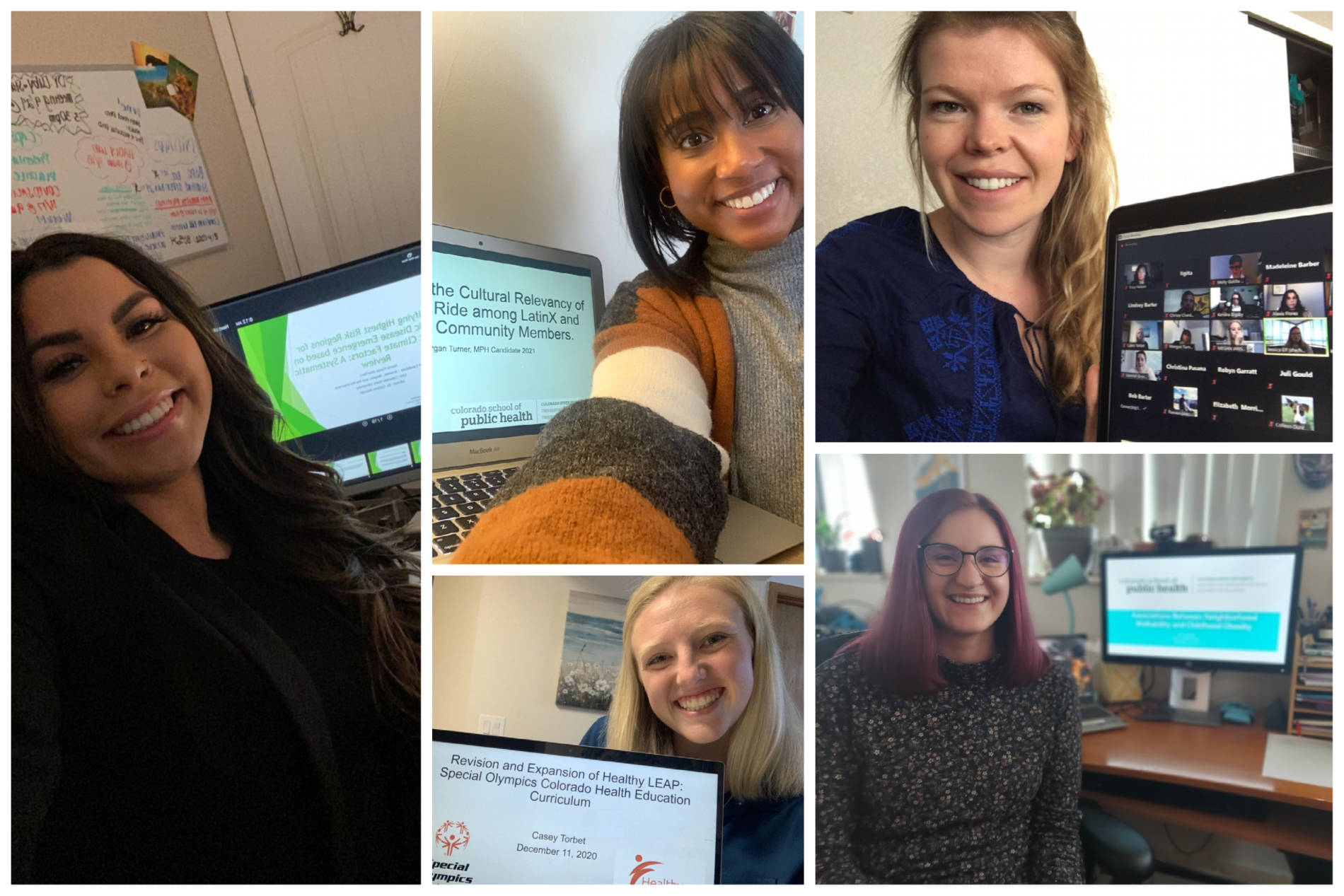MPH students powered up their laptops and tuned in from their living rooms, kitchens, and home offices for this fall’s virtual Public Health Forum. The Forum is held every semester and is an opportunity for MPH students to present on their semester-long capstone projects. This year the forum was held virtually due to the COVID-19 pandemic. Ten students from 5 different concentrations presented on Zoom on a variety of topics. MacKenzie Hennes, from the Epidemiology concentration, presented her project on goat agritourism. Agritourism involves public access to farm-related activities and due to the nature of this growing industry, various public health considerations must be made. Her project involved exploring practices and trends within the U.S. goat agritourism industry to assess public health implications for participants and operations. She then validated and analyzed the data and translated it to deliverable formats, including reports, informational briefs, and presentations.
“My favorite part of my capstone project was receiving the results and putting them into meaningful formats that will be useful for stakeholders to improve goat agritourism” she said.

MacKenzie says her work during her capstone has inspired her to pursue similar opportunities in her future career.
“I think agriculture and veterinary medicine are integral to the health of people and our environment; working at this intersection is an area I plan to continue pursuing” she said.
Alexis Flores, from the Animals, People and Environment concentration, presented her project on identifying the highest risk regions for zoonotic disease emergence resulting from climate change. Severe climate changes in specific regions can act as sentinel for zoonotic disease emergence. These include increased land surface temperature, extreme rainfall, land-use change, flooding, and other water and surface related events. Alexis conducted a comprehensive literature search of three databases and extracted 53 full papers to conduct a meta-analysis and spatial data analysis to determine which region had the greatest effects from climate change resulting in zoonotic disease emergence and reemergence. From the relevant literature, 48 regions were identified with nine climate change factors, as well as 39 zoonoses spanning seven disease classes. The regions with 10 or more climate change factors included China, the United States, Canada, Brazil, Kenya, and Russia.
“One Health, Epidemiology of Infectious and Zoonotic Diseases, and GIS (Geographic Information System) in Public Health were three courses that inspired my project. These courses were also foundational in my Animals, People, and the Environment concentration experience” Alexis said.

Alexis enjoyed making connections with professors and faculty that shared her research interests during this project and those connections were vital for her project design and completion. She is also among the students who are inspired to pursue a similar line of work and focus after graduation.
“I plan to pursue an interdisciplinary PhD that focuses on environmental factors, zoonotic disease emergence, and host movements” she said.
Casey Torbet, from the Physical Activity and Healthy Lifestyles concentration, presented on her work on the expansion of the school-based Healthy LEAP curriculum. This curriculum is part of the Special Olympics Colorado Unified Champion program and was built to teach health education concepts with relevant and evidence-based information that match the state health education competencies. People with intellectual disabilities are at a higher risk of chronic diseases and shorter lifespans due to the lack of health supporting opportunities and access. Therefore, Healthy LEAP is a way to help mitigate these health disparities by including health education in schools. The objective of Casey’s project was to expand the curriculum into four new curriculums based on grade level, and Casey helped develop these chapters.
“My favorite part of the project was creating the content of the chapters and games. It was challenging, but fun, to find creative ways to explain health topics in a simple way for children, but also those with intellectual disabilities” she said.

Casey’s experience with her capstone has made her excited to look for more health education opportunities in the future.
“This experience enhanced my learning by giving me real world experience in program planning and curriculum creation and the different timelines and outside factors that effect a project” she said.
All 10 students presented important work with significant public health impact at this semester’s Public Health Forum, and many presenters were inspired to pursue similar work after they graduate. One of the benefits of the virtual format is that it allowed for family and friends to attend, which may not have been possible in person. As someone who presented at the Forum this time and has attended others, I’m always impressed and inspired by my fellow classmates, and I walk away having learned something new.
Written by Megan Jansson

